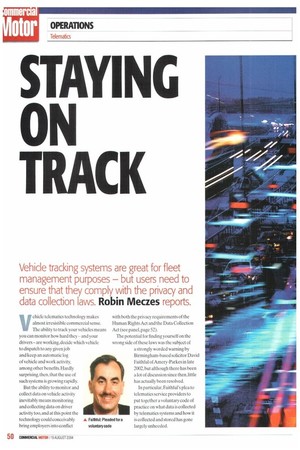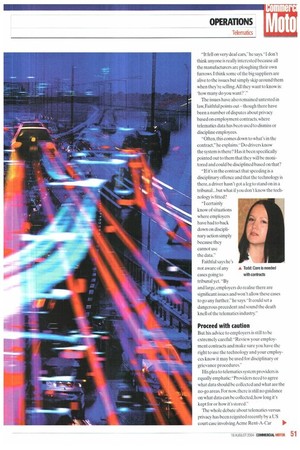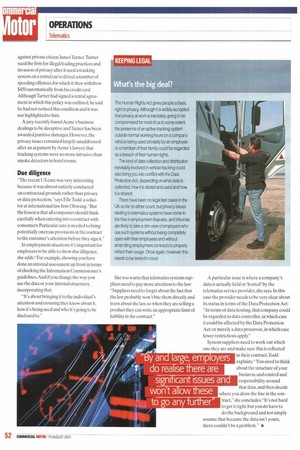STAYING ON TRACK
Page 50

Page 51

Page 52

If you've noticed an error in this article please click here to report it so we can fix it.
Vehicle tracking systems are great for fleet
management purposes — but users need to ensure that they comply with the privacy and data collection laws. Robin Meczes reports.
Vchicle telematics technology makes almost irresistible commercial sense. The ability to track your vehicles means you can monitor how hard they.and your drivers —are working, decide which vehicle to dispatch to any given job and keep an automatic log of vehicle and work activity, among other benefits. Hardly surprising, then, that the use of such systems is growing rapidly.
But the ability to monitor and collect data on vehicle activity inevitably means monitoring and collecting data on driver activity too, and at this point the technology could conceivably bring employers into conflict voluntary code A Faithful: Pleaded bra with both the privacy requirements of the Human Rights Act and the Data Collection Act (see panel, page 52).
The potential for finding yourself on the wrong side of these laws was the subject of a strongly worded warning by Birmingham-based solicitor David Faithful of Amery-Parkes in late 2002, but although there has been a lot of discussion since then, little has actually been resolved.
In particular, Faithful's plea to telematics service providers to put together a voluntary code of practice on what data is collected by telematics systems and how it is collected and stored has gone largely unheeded. "It fell on very deaf ears," he says."I don't think anyone is really interested because all the manufacturers are ploughing their own furrows. I think some of the big suppliers are alive to the issues but simply skip around them when they're selling. All they want to know is: 'how many do you want?'."
The issues have also remained untested in law, Faithful points out— though there have been a number of disputes about privacy based on employment contracts, where telematics data has been used to dismiss or discipline employees.
"Often, this comes down to what's in the contract." he explains: "Do drivers know the system is there? Has it been specifically pointed out to them that they will be monitored and could be disciplined based on that?
"If it's in the contract that speeding is a disciplinary offence and that the technology is there, a driver hasn't got a leg to stand on in a tribunal... but what if you don't know the technology is fitted?
"I certainly know of situations where employers have had to back down on disciplinary action simply because they cannot use the data."
Faithful says he's not aware of any A. Todd: Care is needed cases going to with contracts tribunal yet. "By and large. employers do realise there are significant issues and won't allow these cases to go any further," he says. "It could set a dangerous precedent and sound the death knell of the telematics industry."
Proceed with caution
But his advice to employers is still to be extremely careful: -Review your employment contracts and make sure you have the right to use the technology and your employees know it may be used for disciplinary or grievance procedures.
His plea to telematics system providers is equally emphatic:"Providers need to agree what data should be collected and what are the no-go areas. For now, there is still no guidance on what data can be collected, how long it's kept for or how it's stored.
The whole debate about telematics versus privacy has been reignited recently by a US court case involving Acme Rent-A-Car 1111' against private citizen JamesTurner.Turner sued the firm for illegal trading practices and invasion of privacy after it used a tracking system on a rental car to detect a number of speeding offences. for which it then withdrew $450 automatically from his credit card. Although Turner had signed a rental agreement in which this policy was outlined, he said he had not noticed this condition and it was not highlighted to hint A jury recently found Acme's business dealings to be deceptive and Turner has been awarded punitive damages. However, the privacy issues remained largely unaddressed after an argument by Acme's lawyer that tracking systems were no more intrusive than smoke detectors in hotel rooms.
Due diligence
"The recent US case was very interesting because it was almost entirely conducted on contractual grounds, rather than privacy or data protection," says Elle Todd. a solicitor at international law firm Olswang."But the lesson is that all companies should think carefully when entering into a contract with consumers. Particular care is needed to bring potentially onerous provisions in the contract to the customer's attention before they sign it."
In employment situations it's important for employers to be able to show due diligence, she adds: "For example, showing you have done an internal assessment up front in terms of checking the Information Commissioner's guidelines. And if you change the way you use the data or your internal structures, incorporating that.
"It's about bringing it to the individual's attention and ensuring they know about it, how it's being used and who it's going to be disclosed to." She too warns that telematics systems suppliers need to pay more attention to the law: "Suppliers need to forget about the fact that the law probably won't bite them directly and learn about the laws° when they are selling a product they can write an appropriate limit of liability in the contract." A particular issue is where a company's data is actually held or 'hosted' by the telematics service provider, she says. In this case the provider needs to be very clear about its status in terms of the Data Protection Act: "In terms of data hosting, that company could be regarded as data controller, in which case it could be affected by the Data Protection Act; or merely a data processor, in which case fewer restrictions apply."
System suppliers need to work out which one they are and make sure this is reflected in their contract,Todd explains. "You need to think about the structure of your business, and control and responsibility around that data, and then decide where you draw the line in the contract," she concludes. -It's not hard to get it right, but you do have to do the background and not simply assume that because the data isn't yours, there couldn't be a problem." •




























































































































































































